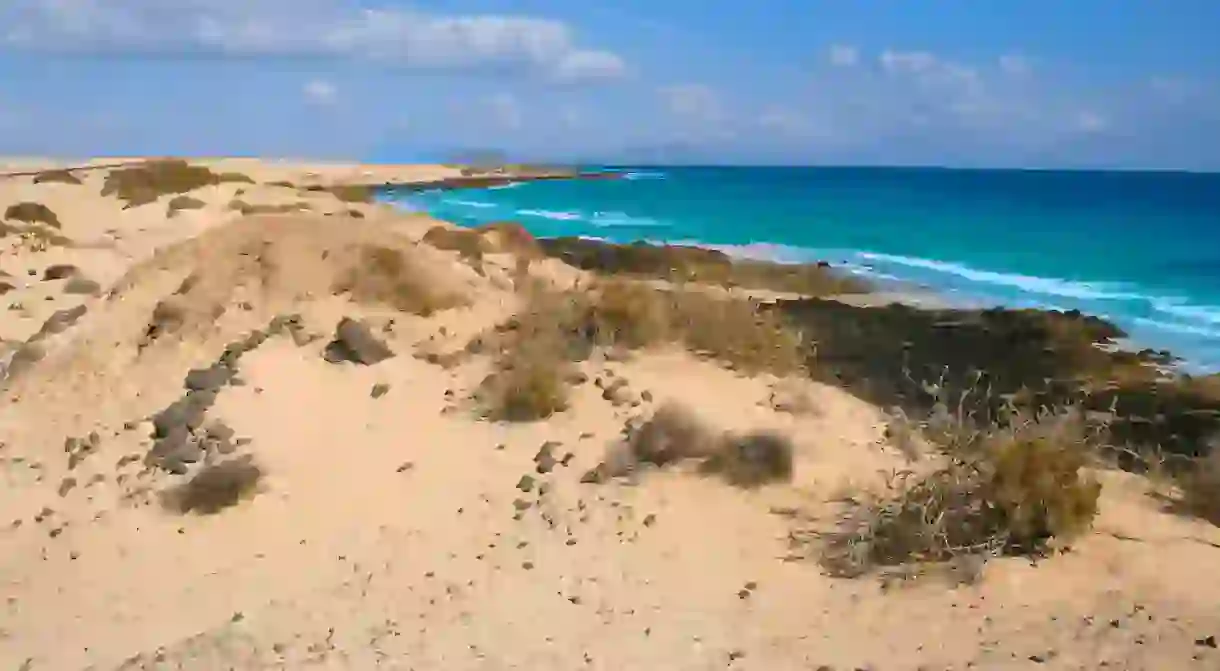A Guide To Island Hopping Around The Canary Islands

The Canary Islands lie approximately 100 kilometres from the south coast of Morocco. An archipelago of seven main islands, they may be part of Spain, but seem to have more in common with the Caribbean due to their laid-back vibe, island time and stunning beaches. Many of the Canary Islands have been awarded UNESCO Biosphere Reserve status because of their unique volcanic landscapes and national parks. Here’s our guide to island hopping between them.
Lanzarote
Lanzarote may be a famous package holiday and clubbing island, but look beyond this and you’ll soon discover what it’s really about. An alien-like landscape of red and black volcanic rocks, Lanzarote is also known for its excellent wines, of the Malvasia variety. Don’t leave without visiting some of its otherworldly lava tubes, some of which you can even go inside. Its excellent climate, long sunny days and dramatic landscapes also means that Lanzarote is popular with athletes and sports teams, many of whom come here to train for Olympic swimming, running and cycling.
Getting there
Lanzarote is the northernmost Canary Island and is home to Arrecife Airport, serving many European destinations, as well as flights to mainland Spain. There is one ferry route from Lanzarote to Fuerteventura, operated by three different ferry companies and offering daily sailings, taking just 25 minutes.

Fuerteventura
Fuerteventura is known as the Canary Islands’ beach, with over 150 kilometres of white sand coastline to explore. Its beaches and dramatic volcanic landscapes mean that it’s the ideal holiday playground. Just offshore you’ll also find plenty of entertainment options such as windsurfing and kitesurfing. And if the beaches don’t do it for you, Fuerteventura’s famous cheeses definitely will.
Getting there
Situated just south of Lanzarote, Fuerteventura’s main airport, El Matorral, serves many European destinations via both low-cost and international carriers. There are two ferry routes between here and Gran Canaria (situated southwest of the island), offering 33 sailings per week.

Gran Canaria
Home to the capital of the Canary Islands, the historic and vibrant Las Palmas, Gran Canaria is known as a continent in miniature. In one day here you can see lush volcanic craters, desert-like sand dunes at Maspalomas, beautiful beaches and rocky barren hills. It’s also a top wellness destination, offering many spa hotels as well as some of Europe’s biggest thalassotherapy centers.
Getting there
Las Palmas de Gran Canaria international airport is the busiest in the Canary Islands in terms of cargo and passenger traffic. It’s served by many airlines from all over Europe and also has many connections to West Africa. There are two ferry routes that run between Gran Canaria and Tenerife, mostly between the towns of Las Palmas and Santa Cruz de Tenerife, offering a total of 64 sailings per week.

Tenerife
The largest island in the Canaries, Tenerife is known for its party vibe and wild clubs, but it has so much more to offer, whether it’s nature, sports or beaches that you’re after. Tenerife is home to a total of eight golf courses with modern facilities, which you can enjoy all year round, and is also one of the Canaries’ top whale watching destinations – 26 species have been spotted off the coast here, including pilot whales, baleen whales and even the mighty blue whale. Tenerife also boasts Spain’s highest mountain, and the third highest island volcano in the world – Mount Teide, located within the UNESCO World Heritage Teide National Park.
Getting there
Tenerife is home to two international airports, the largest of which is Tenerife Sur, the second biggest in the Canary Islands and served by many international and budget airlines to a variety of European destinations. Tenerife also lies within easy reach of Gran Canaria and La Gomera by ferry. Ferries go from Los Cristianos de Tenerife to San Sebastián de La Gomera and take around 40 minutes.

La Gomera
La Gomera is one of the most enchanting and magical of the Canary Islands, where some of the streets are made of sand and there’s an ancient whistling language called Silbo. Explore La Gomera via its 650 kilometres worth of walking trails, taking you to some of its most stunning locations.
Getting there
La Gomera has one domestic airport, serving Tenerife North only, and offering two return flights per day. There is just one ferry between La Gomera and La Palma, operated by two ferry companies and taking around one hour 50 minutes.

La Palma
La Palma is called the beautiful island due to its stunning landscapes of soaring volcanos, verdant forests and paradisiacal beaches. Because of its clear skies and lack of pollution, La Palma has also become known as one of the world’s best locations for star gazing, and was certified the first Starlight Reserve on Earth by the UNSECO Starlight Initiative.
Getting there
La Palma has one main airport, which is served mainly by Binter Canarias and CanaryFly, with island-hopping flights from Tenerife and Gran Canaria. It also serves a variety of other European destinations such as the UK, France, the Netherlands, Belgium and Germany. There are two ferry routes between Tenerife and La Palma, offering a total of 28 sailings per week.

El Hierro
El Hierro may be one of the smallest and most rural of the islands, but it’s also one of the most forward-thinking, with schemes in place to become completely self-sufficient in electrical energy. It’s also one of the best islands for for diving, boasting a marine reserve, home to an incredible 46 dive sites and a large variety of marine life.
Getting there
El Hierro has one domestic airport offering flights to Tenerife North and Gran Canaria only. There is one ferry route between El Hierro and Tenerife operating weekly and taking around two hours 15 minutes.














